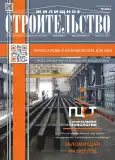Project of functional zoning of the territory of Lianozovsky park in Moscow
- Authors: Slepnev M.A.1, Ivanova Z.I.1, Evseev S.Y.1
-
Affiliations:
- National Research Moscow State University of Civil Engineering
- Issue: No 10 (2024)
- Pages: 72-77
- Section: Articles
- URL: https://ter-arkhiv.ru/0044-4472/article/view/641763
- DOI: https://doi.org/10.31659/0044-4472-2024-10-72-77
- ID: 641763
Cite item
Abstract
Classifying the factors that cause anthropogenic impact on natural complexes and their consequences, three main types can be identified: mechanical, physico-chemical, and biological. One of the applied approaches in the work is to ensure compliance with the maximum recreational loads on the projected tourist routes of the “Lianozovsky Park” Park of Culture and Recreation. The work pays attention to the condition of management and organization of the recreational function, which is aimed at regulating the potential number of visitors based on the proposed regulations on the use of appropriate functional subzones calculated by the authors. The number of visitors to the natural and anthropogenic tourist complex (NATC) was determined, a comparative analysis of the recreational load for compliance with the normative value was carried out, a functional zoning project was proposed, including the design of three subzones of various functional purposes and a mode of their use was proposed.
Full Text
About the authors
M. A. Slepnev
National Research Moscow State University of Civil Engineering
Author for correspondence.
Email: SlepnevMA@mgsu.ru
Candidate of Sciences (Engineering)
Russian Federation, 26, Yaroslavskoe Highway, Moscow, 129337Z. I. Ivanova
National Research Moscow State University of Civil Engineering
Email: IvanovaZI@mgsu.ru
Candidate of Sciences (Engineering)
Russian Federation, 26, Yaroslavskoe Highway, Moscow, 129337S. Yu. Evseev
National Research Moscow State University of Civil Engineering
Email: simonevseev07@mail.ru
Master’s Degree
Russian Federation, 26, Yaroslavskoe Highway, Moscow, 129337References
- Kochurov B.I., Ivashkina I.V. Urban landscapes of Moscow and their spatial transformation. Ecologiya urbanizirovannyh territorii. 2015. No. 2, pp. 48–54. (In Russian).
- Bakaeva N.V., Gordon V.A., Chernyaeva I.V. Forecasting of socio-demographic characteristics in urban design. Gradostroitel’stvo i arkhitektura. 2023. Vol. 13. No. 3, pp. 151–162. (In Russian). https:// doi.org/10.17673/Vestnik.2023.03.19
- Bakaeva N.V., Matyushin D.V., Chernyaeva I.V. Integrated security as-sessment engineering construction object. E3S Web of Conferences. 2023. 371. 02043. AFE-2022. https://doi.org/10.1051/e3sconf/202337102043
- Kormina A.A., Shcherbina E.V. Methodical approach to justification of functional-planning organization and assessment of the residential environment of the city. V International Conference “Sustainable Development of Territories”. Moscow. May 17–19. 2023, pp. 111–117. (In Russian).
- Gordon V.A., Bakaeva N.V., Chernyaeva I.V. Study of the factors of demographic growth of the population of the region. Scientific Journal of Construction and Architecture. 2023. No. 1 (69), pp. 123–134. (In Russian). https://doi.org/10.36622/VSTU.2023.69.1.010
- Slepnev M.A., Filiakova E.I. Assessment of the recreational load of the urban park of culture and recreation Orel city. Biosfernaya sovmestimost’: chelovek, region, tekhnologii. 2019. No. 3 (27), pp. 101–110. (In Russian).
- Slepnev M.A., Zenkovich Z.A. Development of a digital map of functional zoning of the natural-anthropogenic territorial complex of the district park of culture and recreation “Filatov Meadow”. Ecologiya urbanizirovannyh territoriy. 2022. No. 1, pp. 100–108. (In Russian). https://doi.org/10.24412/1816-1863-2022-1-100-108
- Slepnev M.A., Melnikova E.V. Assessment of the recreational load of the Park Zaryadye PKIOI. Ecologiya urbanizirovannyh territoriy. 2019. No. 4, pp. 105–112. (In Russian). https://doi.org/10.24411/1816-1863-2019-14105
- Slepnev M.A., Bakaeva N.V. Project functional zoning of recreational territories. Zhilishchnoe Stroitel’stvo [Housing Construction]. 2020. No. 1–2, pp. 31–37. (In Russian). https://doi.org/10.31659/0044-4472-2020-1-2-31-37
- Slepnev M.A., Ryazantseva A.A., Ensuring the sustainable development of the «Ostankino» in Moscow. Vestnik MGSU. 2021. Vol. 16. No. 9, pp. 1115–1123. (In Russian). https://doi.org/10.22227/1997-0935.2021.9.1115-1123
- Melnikova I.B. Architectural and planning organization of coastal territories in areas of mass residential development. Ecologiya urbanizirovannyh territoriy. 2019. No. 4, pp. 146–152. (In Russian). https:// doi.org/10.24411/1816-1863-2019-14146
- Sokolov N.S. One of the cases of strengthening the base of a deformed anti-landslide retaining wall. Zhilishchnoe Stroitel’stvo [Housing Construction]. 2021. No. 12, pp. 23–27. (In Russian). https:// doi.org/10.31659/0044-4472-2021-12-23-27
- Slepnev M.A., Shmyglina E.V. Formation of the natural framework during the reorganization of industrial zones in Rostov-Na-Don. Zhilishchnoe Stroitel’stvo [Housing Construction]. 2023. No. 12, pp. 46–50. (In Russian). https://doi.org/10.31659/0044-4472-2023-12-46-50
- Slepnev M.A., Mozgunova N.V. Calculated parameters of the functional zoning of the landscaped area of the central part of Reutov city. Construction: Science and Education. 2023. Vol. 13. No. 1, pp. 109–119. https://doi.org/10.22227/2305-5502.2023.1.8
Supplementary files









